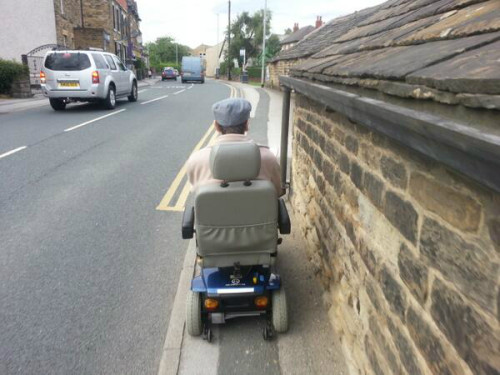The other day I trundled an ex-wheelchair across town, from Munro House to The Corn Exchange. The wheelchair has been converted into a container that carries robot making equipment (yes, I know it sounds a highly improbable tale, but that’s for another time) and is about the size and weight of a fridge-freezer. Mobility is a bit of a challenge.
Surprisingly negotiating the streets of Leeds city centre wasn’t as hard as I thought it would be. Sure, getting in and out of buildings would have been impossible without help – wheelchairs and stairs just don’t go together – but once the thing was on the path it was just a matter of pushing and shoving. Not elegant, took twice as long as my normal walking pace, and I arrived out of breath and aching in some unfamiliar places, but no big sweat (metaphorically speaking). The pavements are reasonably broad and level and the kerbs go flush to the road at all crossings. The pelican crossings give you adequate time to get over to the other side.
This is the city centre though. It’s not like this in most places.
A couple of months ago my dad had to give up his car and start getting about on a motabilty scooter. He’d driven heavy good vehicles up and down the country for over fifty years and always had several cars on the go. He’d only ever had one accident – a motorbike ran a red light and hit him square in the passenger door of his prized Rover P6, which wrote off the bike and left dad a bit anxious everytime he heard the squeal of a two stroke (the rider miraculously suffered not even a scratch). Dad’s a very good driver and an utter gentleman behind the wheel. I’ve never seen him get cross at another road user. He’s never uttered a single bad word against cyclists or sworn at a pedestrian, not even under his breath. But the last few weeks he’s started to get frustrated.
He lives in a small and not very prosperous village between Leeds and Wakefield. The nearest working men’s club is three quarters of a mile, and the nearest shop just short of that. Many of the paths along the main road are narrow (literally centimetres to spare between the kerb edge and the scooter) poorly maintained and there are very few adequate crossings when the going gets tricky. And it’s hilly. The street from his flat to the main road is a one-in-five incline and some stretches of the journey are one-in-seven to one-in-six. The scooter manual recommends not to attempt more than a one-in-eight hill – there’s a chance of tipping and a likelihood that the motor won’t be able to cope with the demand.
He’s already had a couple of worrying “minor” incidents.
Dad’s not one to complain. He certainly wouldn’t expect that anything should be done to make it easier for him to get about in the place where he lives. He thinks it’s his problem. He’ll find some way to cope with it or he’ll simply stay at home.
I imagine most of us think pretty much the same. Usually we manage to get about without thinking too much about it, and if we encounter problems we usually blame our fellow travellers – there’s too many of them, they don’t observe the etiquette of the street, they don’t have any manners these days … complete with your own list of moans and groans. We rarely think about the place we are in – the fabric and fixtures of the city – and how it enables or restricts our movements. Probably because we don’t think we could have any impact. That stuff’s just there.
But if you think a city ought to be a shared space where we all have to get along to get around then that stuff’s pretty important. It’s obvious we aren’t doing a particularly good job at sharing our city’s space out equally amongst it citizens. Dad’s just coming to realise how privileged he’s been to spend most of his life behind the wheel of a diesel powered monster – other road users tend to defer to you when you are trucking along towing 32 tons behind you. Now he’s been “reduced” to something the size of a go cart which he has to plug in for an hour every time he wants to nip out for a loaf of bread he see’s the world differently. He’s not even a pedestrian now, he’s in the pedestrian underclass, not even able to walk the streets, feeling like he’s always “in the way”.
The Culture Vulture is hosting a conversation this Wednesday evening at The Belgrave Music Hall and we are meant to be talking about how to make Leeds a more walkable city. But as someone pointed out to me on Twitter (thanks @pennyb) not all walking is equal, and we aren’t all equally walkers. So I hope the conversation takes that into account. For me the conversation is about how to make the place better for all of us, however we move about in it. What do you think? Why don’t you come along on Wednesday and talk about it?
